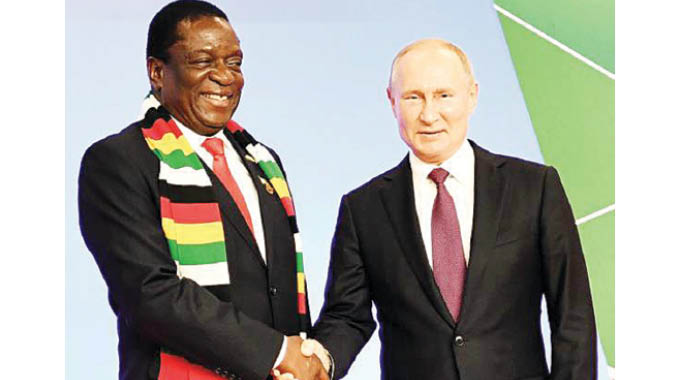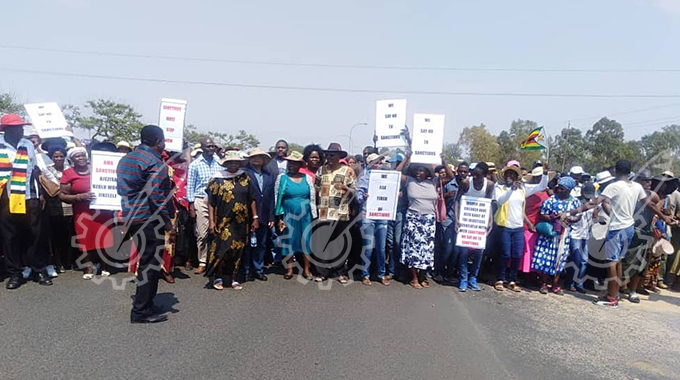EDITORIAL COMMENT: Zimbabwe should exploit business opportunities in Russia

PRESIDENT Mnangagwa’s visit to Sochi for the Russia-Africa Summit has buttressed his commitment towards the international re-engagement drive. In fact, he is taking the lead in marketing Zimbabwe’s vast investment opportunities to the whole world.
The President also continues to drive efforts to spruce up the country’s image, which had over the years been battered by the Western media in its attempt to justify illegal sanctions imposed on the country by the United States and its allies. Relations between Russia and Zimbabwe continue to strengthen, with the two countries forging strong economic ties, particularly in mining and agriculture.
The inaugural Russia-Africa summit, which opened on Wednesday and was co-chaired by Russian President Vladimir Putin and African Union chairman, President Abdel Fattah el-Sisi of Egypt, was therefore an opportunity for President Mnangagwa to elevate those relations and position Zimbabwe for investment from Russia.
The two-day summit, which ended yesterday, was running concurrently with an economic forum. President Mnangagwa met with a group of 20 Russian investors and buyers from various sectors of the economy including manufacturing, agriculture, mining, transport, tourism, energy and retailers led by Ms Daria Ruchkova from the Federal State Enterprise.
In one of the meetings attended by Acting Foreign Affairs Minister Professor Mthuli Ncube, ICT Minister Kazembe Kazembe and ZimTrade CEO Mr Allan Majuru, President Mnangagwa was praised by Ms Ruchkova for marketing the country and correcting some misconceptions about Zimbabwe that had been created by the Western media.
Ms Ruchkova said the meeting was an eye opener and Zimbabwe should do more in selling its investment opportunities.
“Very few investors here know about the opportunities in Zimbabwe and the President did a good job to market his country but I think more must be done to put Zimbabwe on the map after its image was tainted by Western media,” she said.
Ms Ruchkova’s comments put to shame elements that have criticised President Mnangagwa’s foreign trips claiming that he was wasting taxpayers’ money. Some media organisations have gone as far as tracking the President’s flights in a bid to discredit the trips, which they falsely claim are a waste of money.
Zimbabwe has for many years suffered damage from sanctions and negative publicity mostly from the Western media and Western funded media houses necessitating an aggressive campaign by the Second Republic to market the country.
And what better way to push an aggressive campaign than to have it led by the highest office in the land. The international re-engagement drive, which seeks mostly to mend soured relations and enhance existing ones, is an economic initiative to attract investment and strategic partnerships to Zimbabwe towards the development of the country.
It is refreshing, therefore, to hear comments from Ms Ruchkova that serve to confirm that the re-engagement drive led by President Mnangagwa is not only of serious importance but is recording major successes. In the meeting, President Mnangagwa pleaded with the business people to assist in the recovery of Zimbabwean companies decimated by illegal sanctions.
He told them that under the “Zimbabwe is Open for Business” mantra, it was important for Russian business people to take up opportunities that exist in many sectors including sanitation, transport and tourism.
“Over 80 percent of the manufacturing sector was linked to the United Kingdom and they imposed sanctions on us and those companies could not access new technology, could not access retooling, could not access spares. So, we are 20 years behind in that sector; we need new machinery so that production starts and people get jobs.
“Our transport sector is also behind; we have the worst transport system in the region. We need buses, big and small, either we import or we have joint ventures in order to boost our transport system,” President Mnangagwa.
“Despite the sanctions, the population is still growing hence we need investment in sanitation and water we need clean and drinkable water accessible by everyone.
“We need clean water in the urban areas. In energy, we need investment in transmission, carrying of power from the source until it is distributed to the last consumer.”
President Mnangagwa also met Uralkali chief of the board of directors Mr Dmitriy Mazepin, who expressed the company’s interest in investing in the mining and agricultural sectors. The company has already been supplying Zimbabwe with fertilizer since January.
After meeting President Mnangagwa, Mr Mazepin said Zimbabwe has numerous investment opportunities that should be exploited to cement bilateral relations between Harare and Moscow. He also promised the President that his company will invest more in Agriculture and mining.
The President’s trip therefore achieved its objectives of promoting trade co-operation and cementing political ties that date back to the liberation struggle. Zimbabwe should now build on its strong ties with Russia by tapping into business opportunities abundant in that country. Since coming into office, President Mnangagwa has placed emphasis on the need to reposition Zimbabwe on the international arena after years of isolation and we are happy to report that the re-engagement exercise is bearing fruit.








Comments